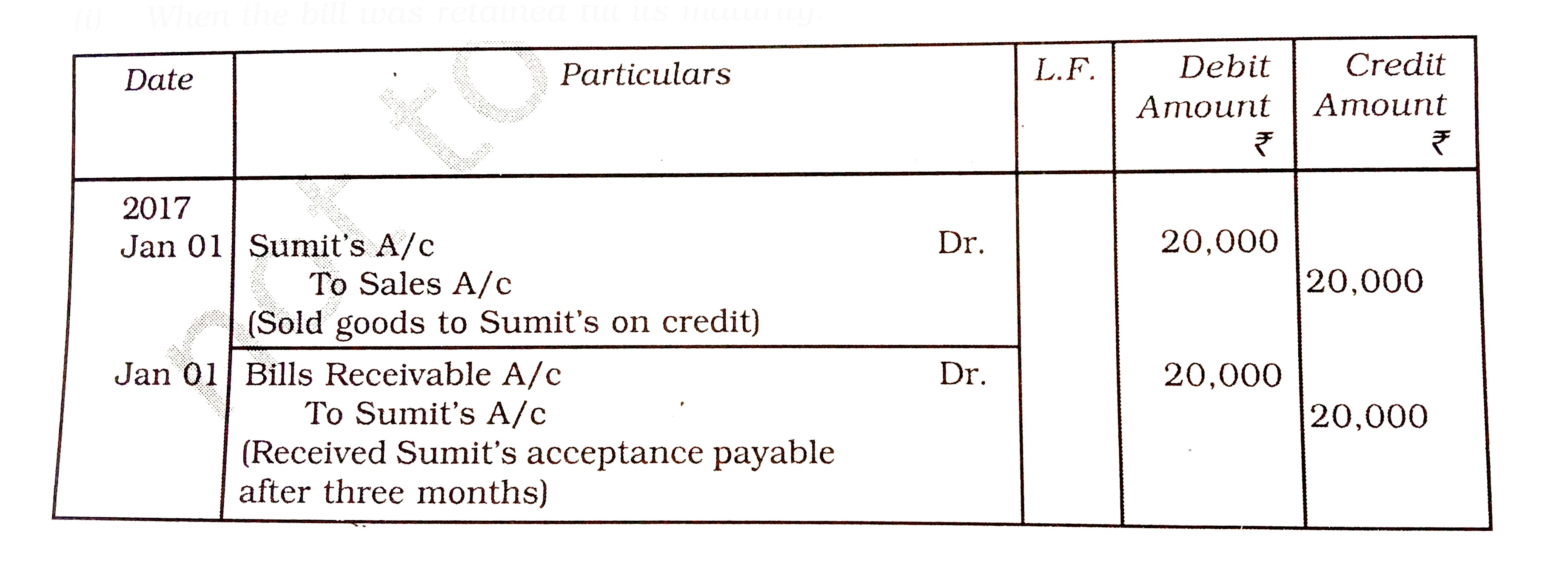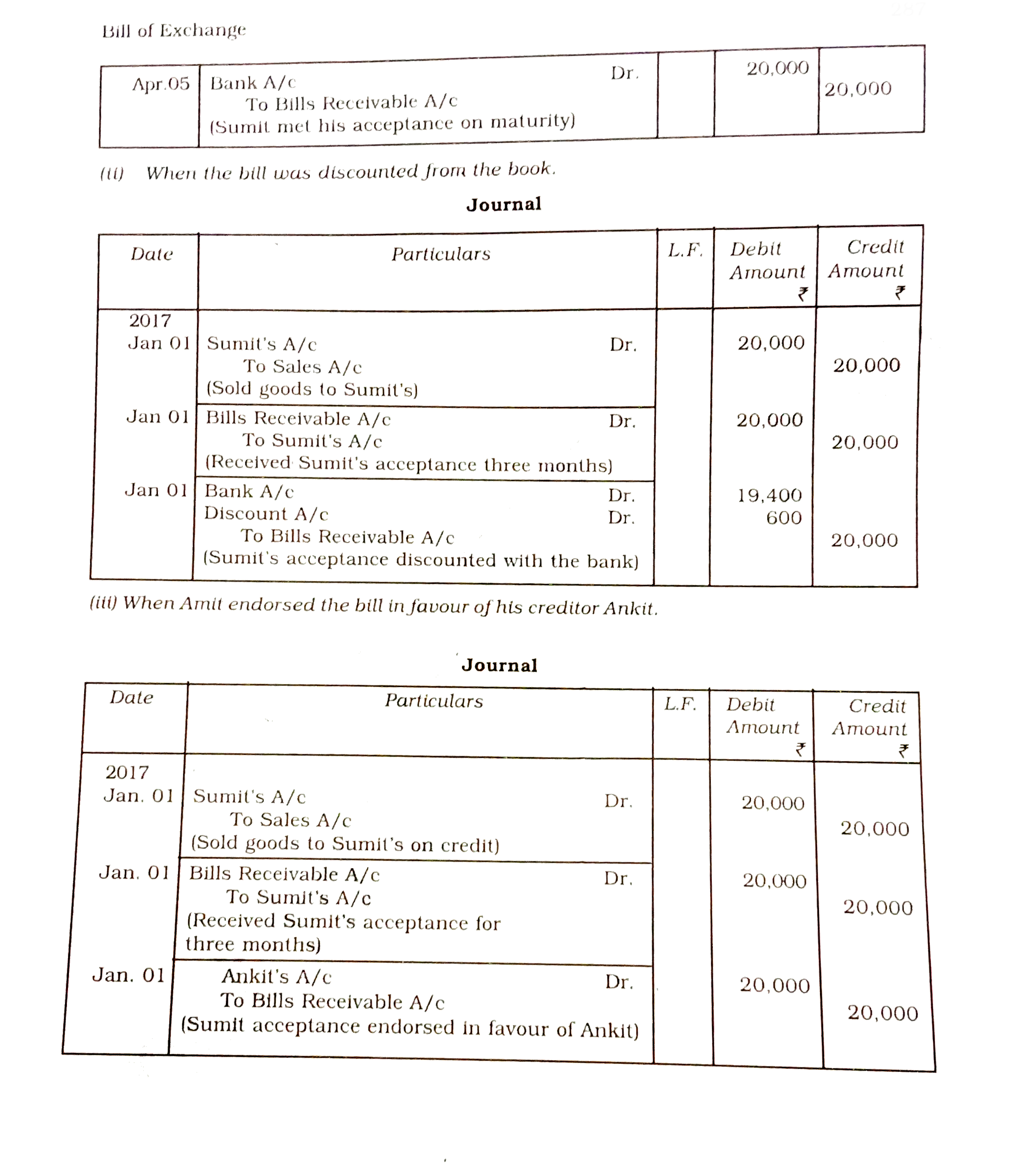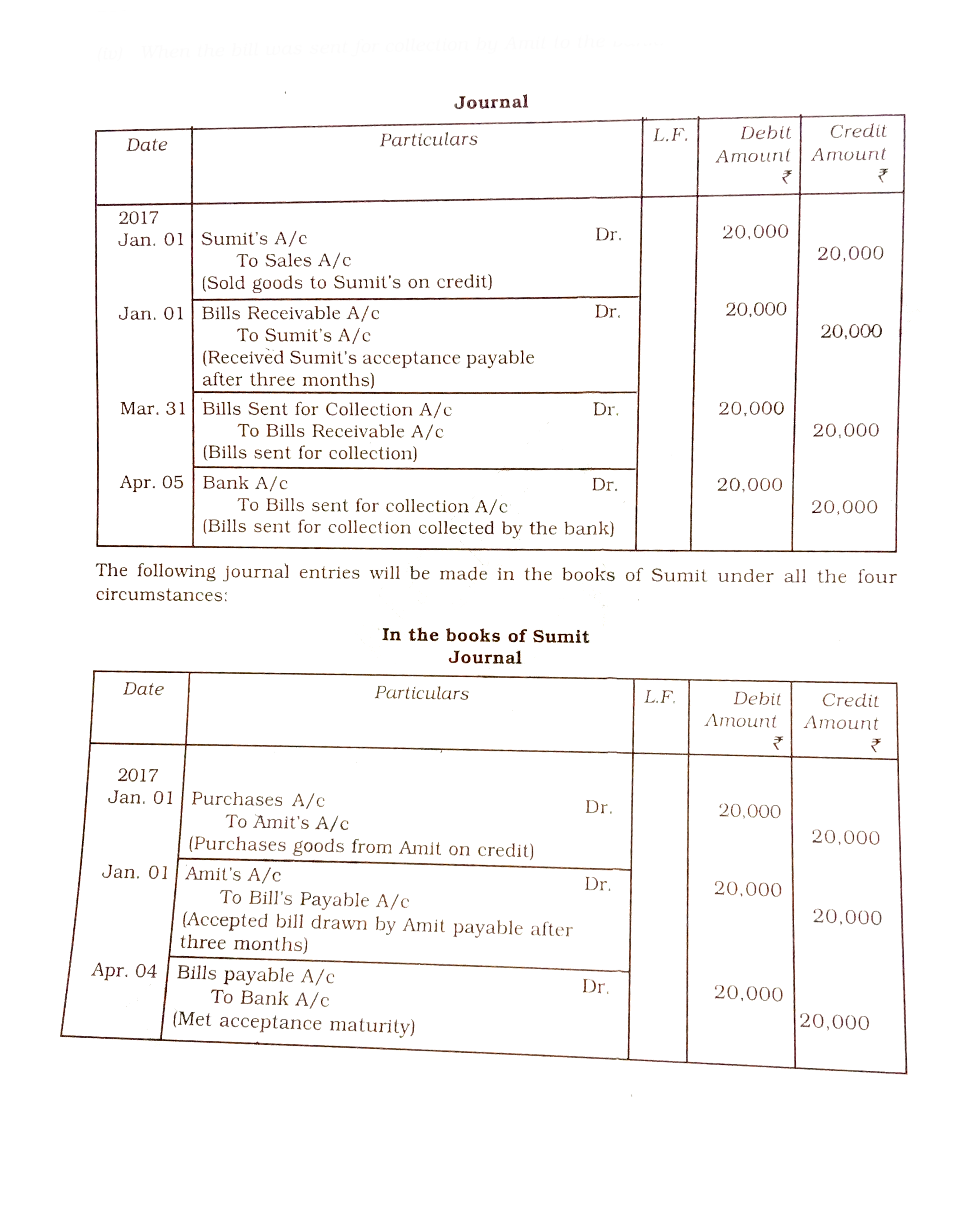Amit sold goods for Rs 20,000 to Sumit on credit on Jan 01,2017. Amit drew a bill of exchange upon Sumit for the same amount for three months. Sumit accepted the bill and returned it to Amit. Sumit met this acceptance on maturity. Record the necessary journal entries under the following circumstances:
(i) Amit retained the bill till the date of its maturity and collected directly
(ii) Amit discounted the bill @ 12% p.a from his bank
(iii) Amit endrsed the bill to this creditor Ankit
(v) Amit retained the bill and on March 31,2017 Amit sent the bill for collection to its bank. On April 05,2017 bank advice was received.
Books of Amit Journal
(i) When the bill was retained till its maturity.



Topper's Solved these Questions
- BILL OF EXCHANGE BOOK - NCERTCHAPTER - BILL OF EXCHANGE EXERCISE - Test Your Understanding-I
10 Videos
- BILL OF EXCHANGE BOOK - NCERTCHAPTER - BILL OF EXCHANGE EXERCISE - Test Your Understanding-II
8 Videos
- BANK RECONCILIATION STATEMENTBOOK - NCERTCHAPTER - BANK RECONCILIATION STATEMENTEXERCISE - LONG ANSWER
3 Videos
- CASH FLOW STATEMENT BOOK - NCERTCHAPTER - CASH FLOW STATEMENT EXERCISE - Numerical Questions
12 Videos
Similar Questions
Darshan sold goods for Rs 40,000 to Varun on 8.1.2016 and drew upon him a bill of exchange payable after two months. Varun accepted the bill and returned the same to Darshan. On the due date the bill was met by Varun. Record the necessary Journal entries in the books of Darshan and Varun in the following circumstances.
• When the bill was retained by Darshan till the date of its maturity.
• When Darshan immediately discounted the bill @ 6% p.a. with his bank.
• When the bill was endorsed immediately by Darshan in favour of his creditor Suresh.
• When three days before its maturity, the bill was sent by Darshan to his bank for collection.
View SolutionOn Jan 01,2017 Shieba sold goods to Vishal for Rs 10,000 and drew upon him a bill of exchange for 2 months. Vishal accepted the bill and returned it to Shieba. On the date of maturity the bill was dishonoured by Vishal. Record the necessary entries in all the cases listed below in the books of Shieba and Vishal:
(i) When the bill kept by Shieba till its maturity,
(ii) When the bill is discounted by Shieba for Rs 200,
(iii) When the bill is endorsed to Lal Chand by Shieba.
View SolutionViaml purchased goods Rs 25,000 from Kamal on Jan 15, 2016 and accepted a bill of exchange drawn upon him by Kamal payable after two months. On the date of the maturity the bill was duly presented for payment. Vimal dishonoured the bill. record the necessary journal entries in the books of Kamal and Vimal when.
• The bill was retained by Kamal till the date of its maturity.
• The bill was immediately discounted by Kamal with his bank @ 6% p.a.
• The bill was endorsed by Kamal in favour of his creditor Sharad.
• Five days before its maturity the bill was sent by Kamal to his bank for collection
View SolutionA sells goods of ₹ 10,000 on 1st March, 2019 to B on credit. B accepts a bill on the same date for the amount payable three months after date. A discounts the bill at 6% p.a. from bank on 4th April.On maturity, the bill is met by B. Pass the necessary Journal entries in the books of both the parties.
View SolutionOn 1st January 2019, A sold to B for ₹ 10, 000 and drew upon him a billl at 3 months for the amount. B accepted the bill and returned it to A. on 4th March, 2019, B retired the bill under rebate of 6 % p.a.
Record these transactions in the Journal of A and B.
View SolutionOn 1st January , 2019 X sold goods of ₹ 20,000 to Y and drew a bill on Y at months of the amount. Y accepted the bill. The bill is met on maturity. Pass the necessary Journal entries in the books of X and Y , if X dicounted the bill @ 12% p.a. from bank on 4th January
View SolutionA bill for ₹ 4,500 is drawn by Mohan on Ram Nath and accepted by the latter. Show the journal entries that would be recorded in the books of both the parties under each of the following circumstances :
(i) Bill is retained till the due date.
(ii) Bill is discounted with his bank, Bank of Baroda, for ₹ 4,380.( Ignore GST)
(iii) Bill is endorsed to creditor Mehtab in settlement of his debt of ₹ 4,520.
(iv) if Mohan sent the bill to his bank for collection.
View SolutionA drew a bill of ₹ 1,000 on B of 3 months which was duly accepted by the latter. A endorsed the bill to C in full payment of his own acceptance to C for a like amount. C endorsed the bill to B.
pass the journal entries in the books of A, B and C.
View SolutionX draws on Y a bill for ₹ 4,000 which was duly accepted by Y,Y meets the bill on its due date. Show what entries would be passed in the books of X under each of the following circumstances.
(a) If X retains the bill till due date.
(b) if X discounts the same with his banker paying ₹ 100 for discount.
( c) if X endorses the same to his creditor Z in full settlement of his debt of ₹ 4,080.
(d) if X sends the bill to his banker for collection the next day.
View SolutionVishal sold goods for Rs 7,000 to Manju on Jan 05, 2016 and drew upon her a bill of exchange payable after 2 months. Manju accepted Vishal’s draft and handed over the same to Vishal after acceptance. Vishal immediately discounted the bill with his bank@12% p.a. On the due date Manju met her acceptance. Journalise the above transactions in the books of Vishal and Manju.
View Solution
